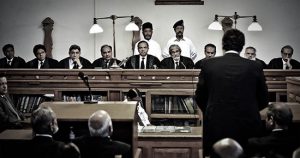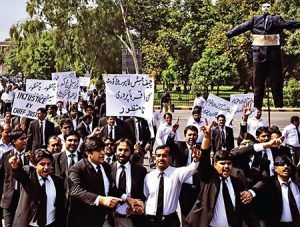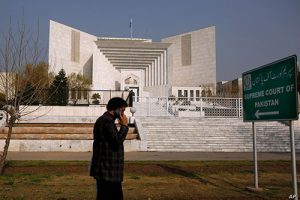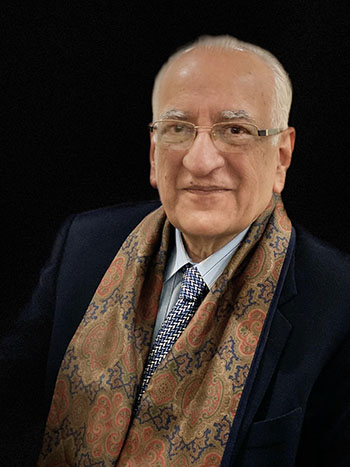Our national vision is enshrined in the Objectives Resolution which forms a substantive part of our Constitution by virtue of Article 2A. It is evident from this Resolution that for the people of Pakistan, good governance requires that the State should be exercising powers through its elected representatives, that there should be full observance of the principles of democracy, freedom, equality, tolerance and social justice as enunciated by Islam, that the people should be enjoying all their fundamental rights, including equality of status, equality of opportunity, equality before law, social, economic and political justice and freedom of thought, expression, belief, faith, worship and association, and that there should be a fully secured independent judiciary able and capable of securing for them these principles and rights.
Unfortunately, it is clear that we are not going to achieve all the objectives contained in our national vision in our lifetime. The road is a very long one and after 74 years we are still at the beginning of the journey, having, along the way, taken many a diversion and suffering several hiccups. But we have to persist and persevere, calling always for Almighty Allah to bless our efforts. If we continue to do so, there is no reason why we should not be able to look back with pride when the torch is handed over by our generation to the next.

Let us take stock of our failures and successes and challenges for the future. First, the subordinate judiciary. Has the subordinate judiciary contributed to good governance in Pakistan? The answer has to be a resounding ‘No.’ There are many honest, capable and hard-working officers in the subordinate judiciary. But the overwhelming public perception is that justice at this level is delivered on the basis of money or influence or both. A Citizens Survey forming part of the Human Development Report for South Asia found that 67 per cent of the interviewees regarded judges as corrupt. Interestingly 88 per cent of the same interviewees regarded political leaders as corrupt, and an even larger 94 per cent regarded police officers as corrupt. A similar survey conducted by Transparency International reported that 63 per cent of those interviewed thought they had to bribe court officials to get a favourable verdict.
Corruption in the subordinate judiciary, whether actual or perceived, erodes respect for those who have the high duty to adjudicate civil disputes, to punish the guilty and to exonerate the innocent. It alienates the common man and instils in him an ingrained feeling of injustice. It negates good governance.
A few suggestions are offered which may over time alleviate this grave and continuing threat to the integrity of our judicial system. These proposals are based on two premises. The first is that it is far easier and cost-effective to try and prevent corruption than to punish the corrupt, and the second is that corruption is a crime of opportunity. If you close the window of opportunity, or make it dangerous to climb through this window, you can reduce corruption.
The first proposal is that when a case is ripe for arguments the District Judge should transfer the case to any other court of competent jurisdiction, including transfer from his own court, if any of the parties applies for transfer. On such application, in which no reasons need be given for seeking the transfer, the transfer order should also direct the hearing of arguments and final order by the transferee court within, say, the next 10 days. This proposal could be coupled with a policy of taking administrative action in cases where more than a specified number of such transfer applications are received against a particular presiding officer.
Another proposal is that counsel for both parties should be required to file their written arguments. This should effectively dissuade lower courts from not noticing arguments when writing judgments on other than the merits of a case. The proposal has the further advantage that it will save court time and eliminate disputes in appellate courts about whether a particular ground was urged in the court below. Hopefully this will also improve the level of assistance from the Bar. This proposal could be coupled with a policy directive that whenever an appellate court comes to the conclusion that the reasoning of the lower court was perverse, the appellate court shall report the matter to the competent authority for appropriate proceedings against the concerned presiding officer.

The negative public perception is not based on the corruption factor alone. Of equal importance is the factor of delayed justice. From time to time many procedural changes have been made which have improved the speed of justice. However, the reality remains as it was: a huge backlog of over two million cases and a number of years before the average case passes through each level of the judicial hierarchy. It is time to think of more radical reforms. Let us convert to a uniform 3-tier system: trial court, appellate court, Supreme Court. The three-tier system is already there in a number of special laws e.g. banking, labour and environmental laws. Let us abolish the civil courts and start the first tier with additional district judges recruited through a competitive examination process open to BA LLBs between 35 to 45 years of age, with not less than 10 years practice. The appellate court should be the High Court. To cope with the backlog, a sufficient number of additional district judges could be recruited on contract for 5 years till the number of pending cases has been reduced to acceptable levels. Senior lawyers could also be appointed for a fixed 5 year term as ad hoc judges of the High Courts for tackling the backlog. The target should be for the average case to pass through the trial court stage within one year, and again not more than one year at the appellate stage. Inevitably there will be transitional problems in moving from the current 4-tier system to the proposed 3-tier one, but surely they can be overcome. The 3-tier system will cut years from the final disposal of the average case. It will also greatly improve the quality of judgments because the trial courts will be manned by far more experienced judicial officers.
Even if a uniform 3-tier system is not possible or feasible, the Supreme Court must nevertheless cause an exercise to be made as to how many additional civil court judges, district judges and high court judges are required on the yardstick that the average case should pass through each of these three levels within not more than one year at each stage. Parliament should then be asked to allocate funds accordingly, keeping in mind that speedy access to justice for all is a fundamental prerequisite for good governance.
The perceived damage to the integrity of the judicial system has not left untouched the superior judiciary. Suffice to stress, in this behalf, that the independence of the judiciary depends, in the first instance, on the public conviction that the judges of the superior courts are models of integrity in all its forms, and the consequential need for the Honourable Judges to devise and enforce transparent accountability mechanisms for themselves. Pertinent mention may also be made of the imperative of ensuring continuance, on a lasting basis, of improved Bench-Bar relations. Nothing damages the image of the judicial institution in the public eye quite so much as that of a House divided against itself.
Good governance requires strong institutions. The message to build strong institutions was given to us more than 1400 years ago by Almighty Allah when through verse 159 of Sura Al-Imran He made it obligatory on the Holy Prophet (Peace Be Upon Him) to seek counsel in all affairs. Strong institutions create a system which automatically produces the leadership for the continued growth of these institutions. The economic and social success of the West and Japan and the East Asian and South-East Asian States is based on the strength of their institutions. In the context of our Islamic Republic, our institutions need to be built and strengthened on the basis of Adl wal Ihsan. Adl represents the rule of law and regulates selfishness and self-interest. Ihsan blends the rule of law with equity and acts to protect against injustice and to help those in need. In building institutions based on the principles of Adl wal Ihsan we travel a step beyond good governance. We enter the realm of good humane governance.
In our Constitution, the right to food, the right to education, the right to health, the right to employment, the right to water and electricity, the right to a safe and clean environment and many other economic rights are principles of state policy subject to availability of resources. In the Shehla Zia case (PLD 1994 SC 693) the Supreme Court held that these rights are part of the fundamental right to life. For the sake of good humane governance, the Supreme Court must, either of its own motion or on the basis of application made by any public-minded citizen, continue to take judicial notice of all situations where the Executive has failed to act on violation of these fundamental rights, and pass appropriate orders for the well-being of the affected citizens.
Public interest litigation on the basis of simple individual applications or suo moto notice taken by the Court itself has provided a speedy and effective remedy for violation of fundamental rights. It has fostered the concept of participative justice. There are, however, obvious practical limits to the number of cases that the Supreme Court can entertain and adjudicate upon in exercise of such jurisdiction and consequently the emphasis has to be on judicial directions for remedial legislation on the exercise of executive power in a manner that promotes the public interest. Reference may be made in this behalf to the decision of the Supreme Court in the Darshan Masih case (PLD 1990 SC 513) in which the Court directed the enactment of a self-contained enforceable law with regard to bonded labour being cognisant of the fact that it is impossible for the superior courts to intervene in all the acts of injustice that take place in this domain. At the end of the day there is no substitute for changes in the attitudes and practices of the Executive organ as a consequence of judicial directions, laws enacted by Parliament and the Provincial Assemblies and the pressure of the media and other opinion-makers.
One vital part of good governance is the regulation of the discretionary power of government and its functionaries to distribute largesse including jobs, contracts, quotas and licenses. The grant of such largesse must be structured on the basis of rational, relevant and non-discriminatory standards and this is precisely what the Executive was ordered to do in the judgment of the Supreme Court in the Chairman RTA case (PLD 1991 SC 14). The Supreme Court held that wherever wide-worded powers conferring discretion are found in a statute, there remains always the need to structure the discretion. Structuring discretion means regularising it, organising it, producing order in it, so that decisions will achieve a higher quality of justice. The seven instruments for the structuring of discretionary power are open plans, open policy statements, open rules, open findings, open reasons, open precedents, and fair informal procedure. This decision was ultimately incorporated as Section 24A in the General Clauses Act. This law, a fundamental pillar of good governance, was first made when I was the Federal Law Minister.

When told that the Pope in Rome was a powerful force Joseph Stalin, the unlamented dictator of the defunct Soviet Union, is reported to have remarked “How many guns does the Pope have?” Like the Pope, the Supreme Court does not have any guns, but like the Pope it has great moral authority. It is this moral authority, even more than the commands contained in Articles 190 and 204 of the Constitution that make for acceptance of the Courts’ orders and ensures compliance. It is this moral authority that is pivotal for the Courts’ role in ensuring the rule of law and better governance. The continuance and strengthening of this moral authority requires unity within the Court, the firm public perception that the decisions of the Court are fair and just and wholly uninfluenced by any consideration or pressure other than the Constitution and the law, and the further perception that the judges are role models. Moral authority based on these foundations has to encompass the High Courts and, in time, all the subordinate courts so that they discharge their sacred trust in terms of the command contained in verse 58 of Sura Al-Nisa.
“Allah doth command you to render back your Trusts to those to whom they are due; and when ye judge between man and man that ye judge with justice; verily how excellent is the teaching which he giveth you! For Allah is He who heareth and seeth all things.”

The writer is a Senior advocate supreme court and former governor Punjab.


